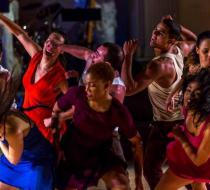Contra-Tiempo Urban Latin Dance Theater in “Full Still Hungry” Favorite
Contra-Tiempo’s first Miami dance performance will bring Ana Maria Alvarez back to her roots. Her father’s family settled in Miami after leaving Cuba in the early ’60s. Most of them, including his four siblings and their spouses and children, still live here, and Alvarez expects much of the clan to attend her show.
With Contra-Tiempo, the dance theater troupe that Alvarez brings to the Carnival Studio Theater at the Adrienne Arsht Center this weekend, she brings together her parents’ activist spirit, the sense of acceptance she found in dancing and the rhythms and moves of salsa. They’ll perform Full Still Hungry, in which Alvarez uses food as a metaphor to look at consumption and culture. (Carmen Miranda, the luscious, fruit-wearing cliché of Latin femininity, plays a prominent role.)
The nine members of Contra-Tiempo, which Alvarez launched in 2005 in her home of Los Angeles, come from all kinds of backgrounds. They range from women who have trained all their lives (one, Bianca Golden, is a graduate of New World School of the Arts) to hip-hop dancers who learned their craft in clubs and on the street. Their bodies also diverge from the lean concert dance norm, an outgrowth of Alvarez’s teenage discovery that her curvy Cuban body didn’t fit the ballet ideal.
“Human beings are different and differently shaped,” she says. “I was told that I would never be a ballet dancer because of my butt. That gave me fire, because it’s about who is allowed to be a professional dancer, who can have a voice based on the genetic makeup of your body? Especially in urban and Latin forms, those bodies are often curvier. I love the different bodies in our company, and I love the idea of them all having a voice.”
In her late teens, Alvarez began traveling to Cuba to study Afro-folkloric dance in Santiago de Cuba, and modern in Havana with the Narciso Medina Danza Contemporanea. She majored in dance and politics at Oberlin College, then went on to New York, where she performed with tango and Afro-Haitian ensembles, did social work with teenagers and attended a leadership program with Urban Bush Women, a New York dance group that emphasizes dance as a way to engage with communities and catalyze social activism. That gave Alvarez the incentive to combine her love of dancing with the activism she had learned from her parents.
“My parents dedicated their lives to making the world a better place,” she says. “That was my religion, my value system growing up. Urban Bush Women affirmed that all this crazy stuff in my head is possible … they showed me how it could happen.”
Contra Tiempo’s activism takes several forms on and off stage. Alvarez’s pieces look at social themes: I Dream America tackles immigration and the tension between blacks and Latinos, while Plastico satirizes the sexualized, commercial version of salsa dancing. The company does a lot of community programs and teaching, at home and on tour.
In Miami, Contra-Tiempo will teach at Jorge Mas Canosa Middle School in Southwest Miami-Dade, at Miami-Dade College Kendall Campus and the African Heritage Cultural Center in Liberty City, where they’ll also give free performances for 2,000 school kids at the Caleb Auditorium. On Wednesday evening, they’ll offer a free community class at the Arsht Center.
The political concepts also extend to the movement. Not only does Alvarez incorporate salsa dancing (particularly the intricate moves and circular group patterns of Cuban rueda), a form invented by non-professionals from all walks of life, into her choreography, but she sees the dance itself as a metaphor for struggle, control and how people relate to each other. Going salsa dancing at clubs is even part of Contra-Tiempo’s training routine.
“There’s a partnership between two people, pushing and pulling, and that resistance is so fundamental for [salsa] dance and music to work,” she says. “In our culture resistance is often seen as negative — you’re anti-American, you don’t believe what we believe. But our country was founded on the idea of pushing back and standing for something other than what most people stand for. That was the jumping off point for the company — the embodiment of that metaphor, and how do you explore it through bodies working together.”
The inspiration for Full Still Hungry came from Alvarez’s examination of her own body. As she was trying to conceive her son, now 4, she consulted a nutritionist, which started her learning and thinking about the politics, economics and culture of food.
“You can’t deal with food without dealing with the politics of consumption and who has access to what kinds of food,” Alvarez says. The piece, which has original music by her brother, Cesar Alvarez, a Contra-Tiempo co-founder who composes most of the group’s scores, is divided into three sections.
“Full is about the current day, over-consumption, eat more more more, consume consume,” Alvarez says. “Still is about nostalgia, the glorification of the past. Hungry is about the future — if we keep consuming the way we do now, we’ll all end up hungry.”







